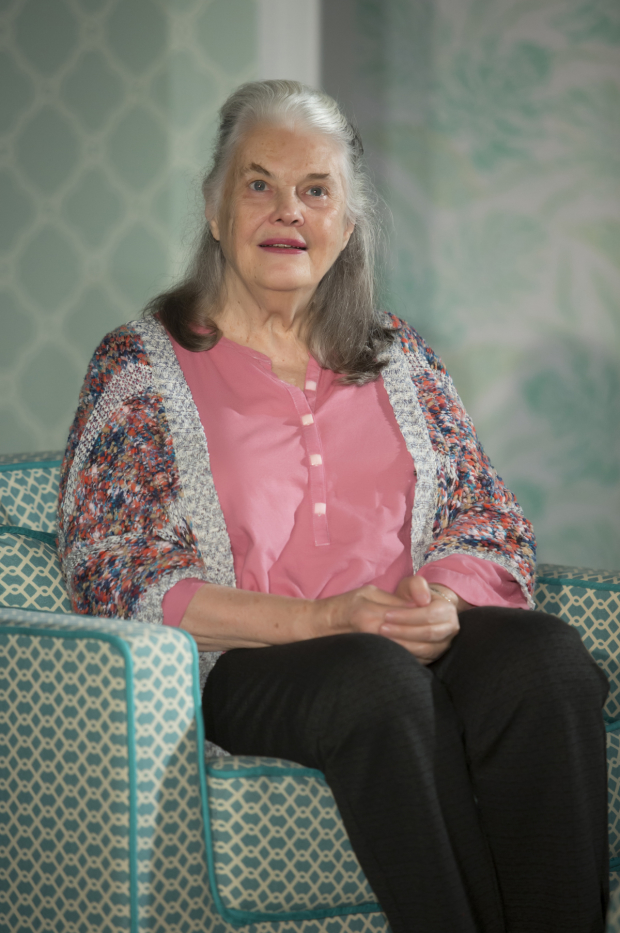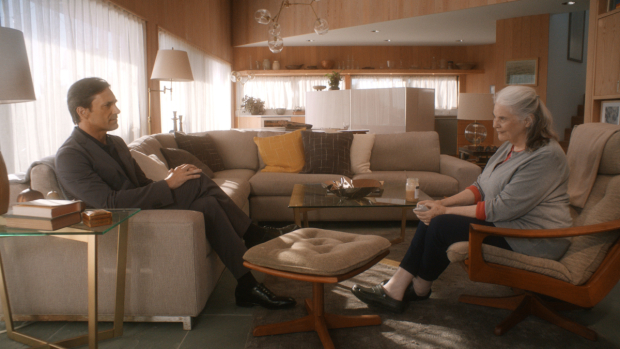At 86 Years Old, Lois Smith Is in Her (Marjorie) Prime
The veteran of stage and screen stars in a film adaptation of a role she originated off-Broadway.
There's a Life Magazine cover, dated November 21, 1955, that features five female actors staring evocatively at the camera. "Shining Young Broadway Stars" was the caption, and it featured, from left, Judy Tyler (Pipe Dream), Jayne Mansfield (Will Success Spoil Rock Hunter?), Susan Strasberg (The Diary of Anne Frank), Diane Cilento (Tiger at the Gates), and Lois Smith (The Young and the Beautiful).
"I always thought that photograph was a little weird," Smith, then 25, now 86, and the only person in the photo still living, says with a laugh. "I don't know why. But we were in our costumes."
In the ensuing six decades, Smith has become a beloved and recognizable presence on stages across the country, as well as the big and small screens. She earned two Tony nominations from her 10 Broadway appearances — for The Grapes of Wrath (1990) and Buried Child (1996), both under the auspices of Chicago's Steppenwolf Theatre Company. She took home Lucille Lortel, Outer Critics Circle, Drama Desk, Obie, and Jeff Awards in 2006 for The Trip to Bountiful, and has appeared in films including East of Eden, opposite James Dean, and the Ryan Gosling-Russell Crowe vehicle The Nice Guys.
Now Smith is earning early Oscar buzz for her work in Michael Almereyda's film adaptation of playwright Jordan Harrison's Pulitzer finalist Marjorie Prime, which hits select cinemas in New York, California, and Massachusetts on August 18. It's a work with which she's intimately acquainted: Harrison wrote the title role of the stage production (an elderly woman coping with memory loss with the help of a computerized hologram of her deceased husband) for Smith herself, and she starred in two different productions of the stage version, and shot the film in between.
As Smith playfully notes, she had seniority in the situation, and she wants the world to catch onto a work she feels quite deeply about. "I really want people to see it," Smith says. "I'm so glad it's going to be out there."

(© Jeremy Daniel)
How did the film version of Marjorie Prime come about?
Michael and I have known each other for a long time, and he knew it was a play that I love. He came to the Los Angeles production [in late 2014] and very shortly after talked to me about how it was something he'd love to make a film of. I got him and Jordan together to talk about it. We shot it on Long Island just before the New York production [in late 2015]. I think I got home at about one in the morning after the very last day of shooting, and rehearsals for the New York production started at 10 the next morning. It was very tight.
What is it like to have worked on the material with three different directors, Les Waters (Los Angeles), Michael Almereyda (film), and Anne Kauffman (New York)?
It's pretty wild, I must say. It's a once in a lifetime event. It was a great plus that I was so familiar with it. I had played this character, and had been living with her for a couple of years. Because I came to it first, before any of them, I felt I had seniority. Michael chose it because I came with it; I was his introduction to it. It was the first time that I had worked with Les Waters and Anne Kauffman, and they both inherited me. Each play moment was new.

(photo provided by Brigade Marketing)
Has cinematic storytelling changed between 1955, when you were in East of Eden, and now?
Isn't that an interesting question? It's a terrible generalization, but I do believe that stories are told with more economy now, more quickly in terms of language and time. We have moved to a quicker pace. There has been an acceleration of storytelling, but you can probably find as many examples of the opposite as well. The film of Marjorie Prime certainly does not give one an illusion of haste.
How did you feel watching the film version of Marjorie Prime for the first time?
I saw it on the big screen at Sundance, and then some months later there was a screening at BAM [Brooklyn Academy of Music]. That was the first time I was beginning to see the movie for itself, not tied up with my history and preconceived ideas, or grief and anxieties, of which there were some because of that period in my life [Smith's partner, the actor David Margulies, had recently died]. That was the time that it had become itself in my mind.
What do you have coming up, stage-wise, besides the 2018 New Group production of Lily Thorne's Peace for Mary Frances?
I'm doing a Craig Lucas play at Playwrights Horizons — it follows hard upon the New Group play. It's called I Was Most Alive With You, and I'm learning sign language, which is really exciting. I'm lucky to have been offered this particular challenge.
At this point in your career, what do you look for in a role? Does that differ from when you were younger?
I must confide in you that I'm rarely offered ingenue roles anymore, so that’s been a change. I've been very fortunate in being offered interesting roles. The norm is that the older you get, the harder it is, but I just haven't had that experience. Both of the new plays that I'm about to do are interesting roles; the films I've been given are varied. I do feel quite blessed about this. I'm so fortunate.
What would 86-year-old you tell 25-year-old you in that Life Magazine photo?
"Courage." And…"It's gonna be all right."







